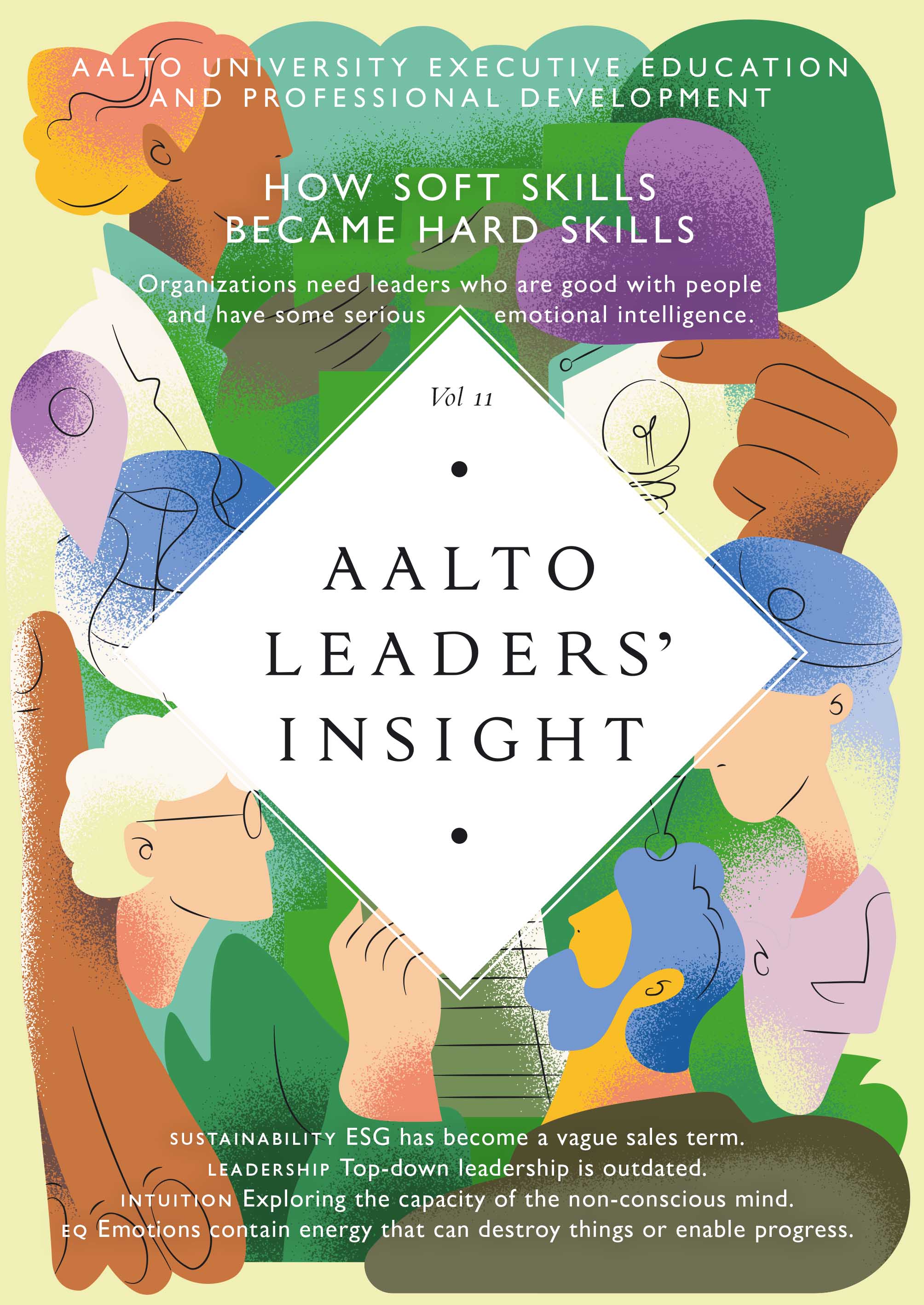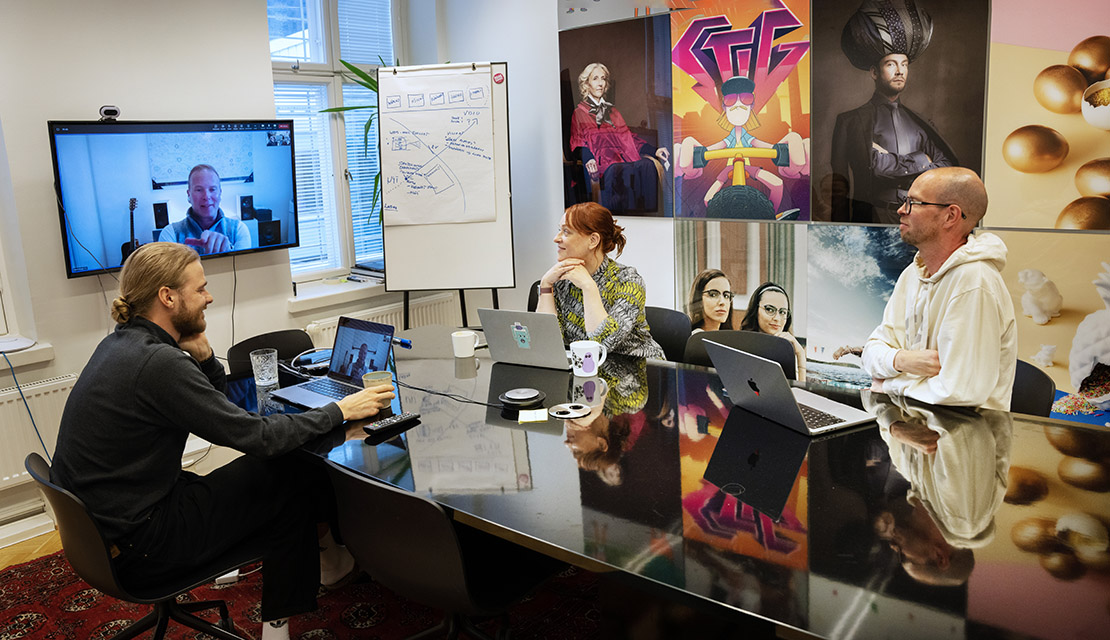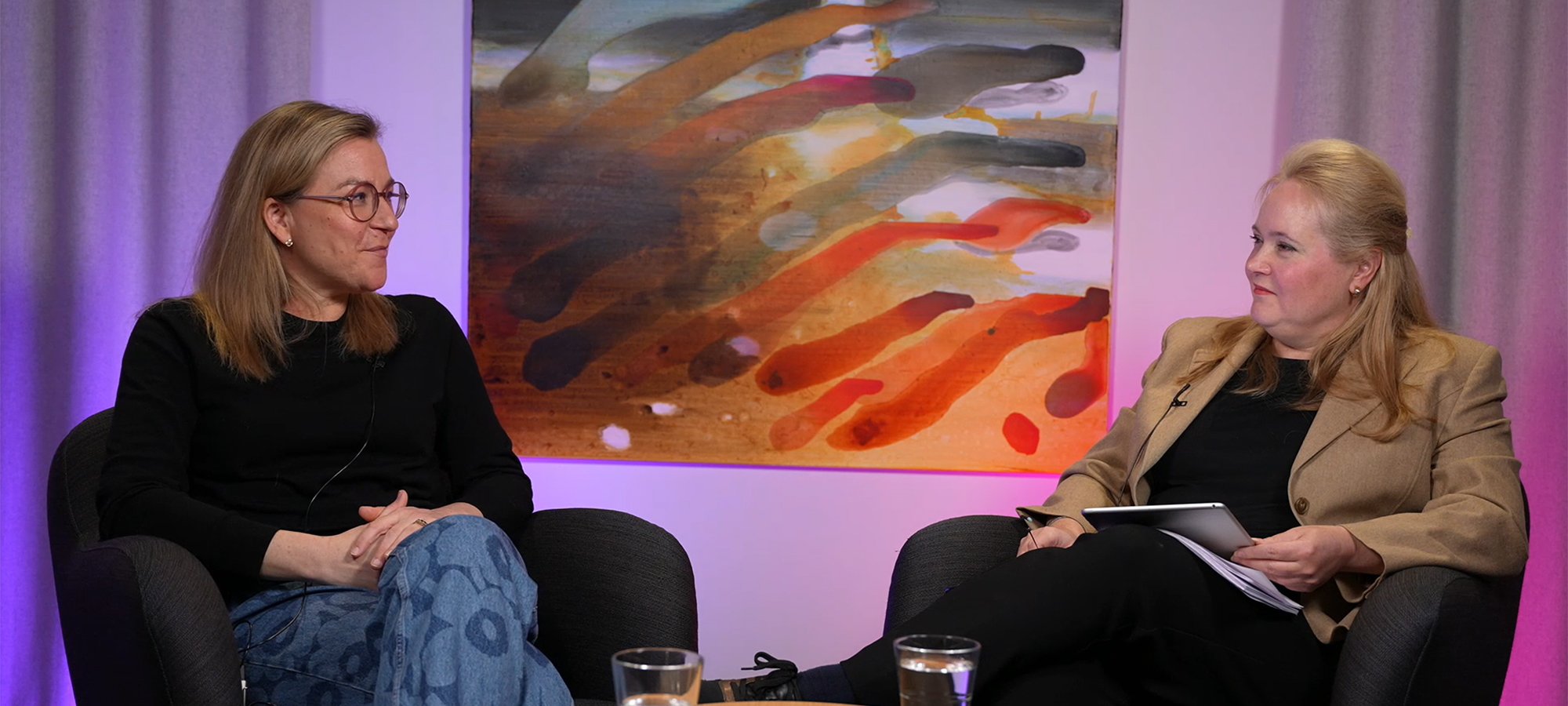Workplaces Are Now Seeking Individuals Who Are Good with People – Therefore, You Should Develop Emotional Skills
Workplaces are now looking for individuals who are good with people. In this article, Professor Timo Vuori explains why it pays to learn emotional skills, and creative workers tell why an atmosphere of dialogue and an empathetic working life is good business.
Listen to the article
Reetta Räty, 28.08.2023
|Long Forms
A message from a colleague at the end of the day: “Once again, I messed up (...) Can you go and talk to M tomorrow?”
In the message, the colleague explains that he gave a team, who had worked round the clock to get a project finished, some rather tough critical feedback. The team feels that the timing of this feedback was, to put it mildly, terrible. After exhausting themselves to get the job done, they were told they were useless, or at least worse than their competitors.
I’m really irritated, too. Patching up bad management takes a hell of a lot of time.
The next day, I talked to M, who was so frustrated they even mentioned resigning.
But we talk through the situation, the emotional turmoil subsides, and we all learn something about ourselves and our ways of dealing with different emotional states.
Years later, I told Timo Vuori, Associate Professor at Aalto University, about this. Vuori has studied emotional skills and their role in organizations. He seems to understand the dynamics of the chain of events. But he doesn’t condemn my colleague; he says it’s a good thing that the person who forgot to use their psychological eye realized what they had done. It makes it possible to address the issue.
“Emotional skills involve being able to recognize feelings and use them in your work,” says Vuori.
When I admit that even after all these years, I still get worked up when I think of the situation I described, Vuori says this shows how much power emotions have in working life. And this is why we’re now talking about them more than ever.
The following example effectively illustrates this change in attitude: Emotional skills are no longer considered soft skills. They’re now a solid part of the core of leadership.
|
|
| “Management should create an atmosphere in which even difficult issues can be discussed,” says Professor Timo Vuori, who has studied emotional skills and their role in organizations. Photo: Mikko Raskinen / Aalto University |
Social skills have become valuable currency in the job market
The term EQ, emotional intelligence, is often used in connection with emotional skills. Leadership guides and training courses have raised empathy, interaction skills, self-reflection, and getting along with people from different backgrounds to the top of the list. These are all “social skills”. And leaders, in particular, need to be good with people.
This principle has also started to show in recruitment. When the Harvard Business Review (HBR July–August 2022) examined data on 5000 managerial-level job descriptions from 2000 to 2017, it found that companies were looking for managers with profiles that were distinctly different from those required in the past. CEO job advertisements, in particular, emphasized the three S's as well as technical and business skills: strong social skills.
Although the HBR used Russell Reynolds’ data to examine the changing requirements of managers (Russell Reynolds Associates is an executive search and leadership advisory firm), the authors of the article point out that it is not only senior management positions that require social skills.
“At all employment levels, more and more jobs today require highly developed social skills. Harvard’s [professor] David Deming, among others, has demonstrated that these jobs have grown at a faster rate than that of the labor market as a whole—and that compensation for them is growing faster than average.”
How did this situation come about? Why has the age of digitalization and artificial intelligence affected work so much that we now need individuals who are good — with people?
Vuori claims that one of the reasons for this change is precisely the development of technical solutions. A machine can take care of processes, but a human must take care of people.
“Working life has taken giant technological leaps and gone beyond certain boundaries, and social skills, in particular, have become bottlenecks,” Vuori says. For example, a single interaction can ruin the outcome of a major technical project if it is miscommunicated to employees or to the boss. The nature of social situations magnifies errors.
We also live in a world of wicked problems and interdependencies. Workplaces are looking for solutions to complex problems that require focused thinking. “You can’t get this kind of work done if you're in an irritated state of mind,” Vuori says.
Many of the changes in the business environment are testing our emotional skills. Work is done in multi-professional teams. An uncertain future horizon requires you to adapt, make quick changes, prioritize, and clarify common objectives. Even in situations that require crisis communication, it doesn't hurt if management is good at reading social situations and acting wisely in public.
|
|
Emotions hold power in workplaces – whether one likes it or not
Aalto EE's Senior Advisor, Ben Nothnagel, leads the personal development process for Aalto Executive MBA participants. According to Nothnagel, understanding and managing emotions is essential for relationships, decision-making, and performance.
“If you want your team to get work done, you need to know how to empathize, build loyalty, promote belonging, and then motivate and possibly inspire them to reach ambitious personal and organizational goals. This, of course, requires the skill of paying attention to moments that impact performance and relationships both at the office and at home.”
Vuori also talks about how atmosphere––emotions, recognizing and regulating them––has a crucial influence on cooperation and how smoothly it functions.
“In a respectful, safe team, people talk openly. Everyone gets the information that is essential for their work, and it becomes easier to get things done.”
Everyone's attitude matters, but the role of the team leader is crucial. If the team leader reacts constructively to mistakes, shows appreciation, addresses poor behavior, and, above all, gives good feedback, the team will find it easier to work together and commit to common goals.
So, we talk about emotions because they have a fundamental impact on how individuals, teams, and organizations behave. And we talk about emotional skills because they have a direct impact on the performance of a company or organization.
Vuori claims that emotional skills can be learned. “Emotions can be used to promote good, but they can also lead to conflict.”
Big fights often start from tiny things
Vuori became interested in the role of emotions in leadership at a young age. He was coaching a women's ice hockey team and realized that, although his technical expertise in the game was first-rate, his message didn't always seem to get through. At that time, it was common in youth hockey for coaches to shout at and even ridicule their players. It was believed that this encouraged better performance. Today, we know better.
“If you want results, you have to thank and encourage,” says Vuori.
Sometimes, it's the simplest of things: You can shout “Hey, shut the hatch” to the players from the box, or you can do it more politely: “Could you shut the hatch, please?”. Both ways get rid of the danger of an open hatch, but the more friendly request doesn’t irritate or intimidate the players. They retain their sense of control and are able to focus on their own performance.
This example may seem small, even insignificant. But it’s precisely in everyday situations like this that emotions rise to the surface. Many people recognize the importance of these small moments at home, whether it's in a relationship, a sibling quarrel, or a conflict between a parent and a child. Big fights often start from tiny things.
The dynamics of interactions aren’t easy to interpret––and they’re especially difficult when it comes to your own behavior. Quite often you feel that you’ve behaved “normally” while the others get worked up, are over-sensitive, get offended, talk over you, don't listen, or even start an argument.
“An outsider often has a different perception of the situation than the person themselves,” Vuori points out. So, asking colleagues for their views on your behavior is actually brave. For example, 360 evaluations help each individual look in the mirror at themselves, as well as through the eyes of others.
“This kind of assessment is like a thermometer: it tells you whether or not you're OK. It also reveals whether your assessment of the situation is the same as that of the thermometer.”
What if the assessment reveals that colleagues find many things that need improvement––a nice way of criticizing?
“The cure is to start paying attention to interactions,” says Vuori. “You have to admit that you feel emotions. You have to recognize them and how they affect your actions. This enables you to ask others how they feel about a certain situation.”
Developing emotional skills requires self-reflection. A simple example: Professor Vuori instructs a manager to take a few minutes each day to think about the emotional reactions some situations caused within themselves and others and what the consequences were.
|
|
Differences between generations are also evident in emotional skills
Generational differences are often raised when we discuss emotions. The basic formula is simple: younger people are better at talking about feelings than older people. In Finland, at least, children learn friend-making skills, participate in “feelings circles”, and practice settling disputes already at kindergarten age.
“Millennials are on a whole different level when it comes to emotional skills,” says Vuori. You can see this at workplaces, not only in how emotions are expressed more but also in how social skills are valued.
“It's beginning to feel a bit embarrassing if you don't know or understand emotional talk.”
Timo Vuori trains experts and managers in the role of emotional skills in organizations. What would he say to a team leader who would like to better take emotions into account in his own team?
Vuori suggests discussing emotions on the basis of a written questionnaire, for example. The issues to discuss can be simple: What things frustrate you? What motivates you in your current job and the way in which you do your work?
“Just basic things like this,” Vuori says. They allow us to talk about issues and situations that we can try to improve at work and on the other hand, things that cause constant frustration.
And here's the important point: Many of the problems––the irritation and frustration, for example–– are because things really are done in a senseless way. This gets on people's nerves, and the solution isn’t an adult feelings circle for venting anger. The solution is to fix the actual issue.
“If IT isn’t working properly, sending people to an occupational psychologist won't help,” Vuori claims. “Supervisory work often involves pointless meetings, meetings have useless agendas, we create unnecessary reports, and we’re given the wrong tools. All this causes frustration and conflicts. It's respectful to everyone not to demand pointless things of people at work.”
It seems as if Vuori is speaking, at least partly, from his own experience at university.
Emotions don't have power only in workplace break rooms or during leisure time – they also sit in executive teams and strategy meetings
Still today, some people may think that social skills, emotional intelligence included, are something you only pay attention to when the more important things have been taken care of. First work, then emotions. Or business first, people after. Or figures first, and only then, such luxuries as good management, effective interactions, and an open atmosphere. So, let's underline the basic point once more. Emotions affect the results of an organization. They’re not something separate from, say, business or strategy-related issues.
We’ll take Nokia as a practical example. Vuori and his colleague, Quy N. Huy from INSEAD University, have published several articles on Nokia's leadership style. For example, they have analyzed the rise and fall of Nokia's mobile phone business from 2005 to 2010.
Still, in 2007, Nokia was the market leader and was seen as an innovative, agile player. Apple's iPhone had a negligible 5% market share at this point. In only a few years, however, this situation had turned on its head, and eventually, Nokia not only lost to Apple but abandoned the entire mobile phone business.
What happened?
Vuori has interviewed around 180 people who’ve worked in Nokia's senior and middle management. It seems that the climate of fear in the company contributed to Nokia's downward spiral.
Vuori claims that when the external threat began to intensify, and competition became fiercer, Nokia put its head in the sand and didn’t dare face the fact that the way things were going, they wouldn’t be the biggest and the best in the mobile phone business for much longer.
“In the interviews, the managers described how things were so difficult on the emotional level in the organization that middle management didn’t want to share bad news with the senior management. Such news was not well received––no-one wanted to face the truth.”
“Senior management, on the other hand, created unrealistic expectations because it felt good.”
A negative emotional climate can have very negative effects on a company. For example, fear can be a barrier to renewal, innovation, and quick reactions to a changing market. It also prevents open discussion of problems.
Vuori says that lessons were learned from Nokia's failure. Before selling the telephone business, the company did some emotional regulation. The aim was to create a safer atmosphere in which to talk about difficult issues.
“Continuing in the phone business would have been nice on the emotional level, but consciously working on emotions enabled us to make the contrary decision.”
In Vuori's view, Nokia's leaders were enlightened about the importance of emotions. “They realized that the previous phase had gone wrong because emotions had taken over.”
|
|
Vuori repeatedly raises the importance of the authenticity of emotions. Faking takes energy––and it's easy to get caught out. How, then, can you "use" emotions if you have to be genuine?
According to Vuori, it's about learning to recognize genuine emotions and responding to them in a humane way. Take the example of change negotiations. Some people in the workplace will lose their jobs. Everyone is worried. The atmosphere isn’t helped by managers pretending to be enthusiastic or telling employees in an info bulletin how results will be even better from now on because there are fewer people.
“It’s a misconception that communication should always be positive,” says Vuori. “People often think you have to spin everything in a positive way and that saying negative things out loud is a bad thing.”
Management should create an atmosphere in which even difficult issues can be discussed. To be genuine, if you involve people in workplace changes, you should do it properly.
“You can give people boundaries and ask them to stay within these when thinking about how to do things. If employees are left feeling that this could have been done more sensibly if they had at least been asked, it’s frustrating for them.”
But negative emotions can also be helpful. The fear of losing your job can make you learn new skills. Jealousy can encourage you to achieve something you envy in another person. Being angry can help you to think about how to open up more. “I’ve written many things about using the power of anger and criticism,” says Vuori.
Even grief can turn into something positive: It can help you let go, retreat into yourself, and think about what really matters to you.
Vuori sums up the power of emotional skills like this, for better or for worse:
“Emotions are like fire: They contain energy that can either destroy things or enable radical progress and superior performance.”
This article is part of an article series published in volume 11 of Aalto Leaders' Insight magazine. In the second part of the article, creative workers tell why an atmosphere of dialogue and an empathetic working life is good business.
Download the latest volume of the magazine!
 |
In the latest volume of the magazine, we discuss intuition’s role in business and leadership, the divisive and constructive power of emotions in working life, ESG’s role as a world saver or just as a vague sales term, and why hierarchic leadership is outdated, and what today’s professionals and experts demand from leaders and leadership. The magazine is in English. |
Aalto Leaders' Insight Vol 11
pdfAalto Leaders' Insight is a library of insights on leadership, working life, and upskilling. In the latest volume of the magazine, we discuss intuition’s role in business and leadership, the divisive and constructive power of emotions in working life, ESG’s role as a world saver or just as a vague sales term, and why hierarchic leadership is outdated, and what today’s professionals and experts demand from leaders and leadership.

























